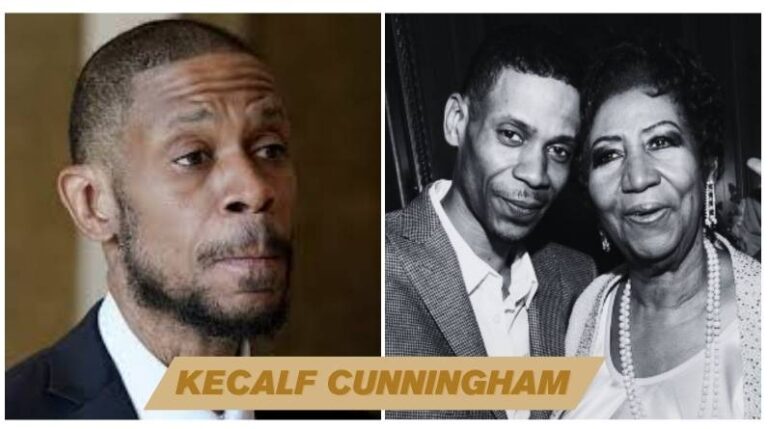In a world obsessed with celebrity lineage and the glamorous lives of famous offspring, Kecalf Cunningham stands as a refreshing anomaly. Born into one of music’s greatest dynasties—as the youngest son of legendary singer Aretha Franklin—Kecalf has deliberately chosen a path that defies expectation. Rather than leveraging his mother’s enormous fame for personal stardom, he has built a life grounded in faith, artistic integrity, and quiet purpose.
This is not merely another story about a celebrity child. This is the story of a man who rejected the spotlight to pursue meaningful work, faced personal struggles with transparency, and now carries his mother’s legacy forward in profoundly authentic ways. As we navigate through 2025, Kecalf Cunningham’s journey offers valuable lessons about identity, resilience, and what it truly means to honor a legacy.
Who is Kecalf Cunningham? Understanding the Man Beyond the Name
Kecalf Franklin Cunningham was born on March 28, 1970, in Detroit, Michigan, to Aretha Franklin and Ken Cunningham, Aretha’s road manager. At 55 years old (as of 2025), Kecalf represents a generation that grew up witnessing the Queen of Soul’s monumental career while navigating the complexities of being a private individual in a very public family.
His full name itself tells a story of intentional parenting—a deliberate combination of his parents’ names, creating something uniquely his own. This naming choice would later prove prophetic of the life Kecalf would choose: one that honored his heritage while carving out his distinct identity.
| Key Information | Details |
|---|---|
| Full Name | Kecalf Franklin Cunningham |
| Date of Birth | March 28, 1970 |
| Age (2025) | 55 years old |
| Birthplace | Detroit, Michigan, USA |
| Mother | Aretha Franklin (1942-2018) |
| Father | Ken Cunningham (Road Manager) |
| Professional Name | KPoint (Gospel Rapper) |
| Net Worth (Estimated) | $22 Million |
| Spouse | Kafi Franklin |
| Children | 6 (including Victorie Franklin, Jordan Franklin) |
The Art of Choosing Purpose Over Fame: Kecalf’s Deliberate Path
Why He Rejected the Traditional Celebrity Route
Perhaps the most defining characteristic of Kecalf Cunningham’s life is what he chose not to do. Growing up as Aretha Franklin’s son presented unlimited opportunities for commercial success, record deals, and mainstream entertainment careers. Yet Kecalf consciously rejected this trajectory.
Instead of pursuing soul music like his mother, Kecalf discovered his calling in gospel rap—a genre that blends spiritual messaging with hip-hop beats. Performing under the stage name “KPoint,” he deliberately keeps his performances in churches, community centers, and faith-based venues rather than commercial concert halls or mainstream music festivals.
This decision wasn’t born from lack of opportunity or talent. Rather, it reflected a profound understanding that true legacy isn’t built on fame—it’s built on impact and authenticity.
The Gospel Rap Philosophy
Kecalf’s musical approach represents a fresh take on artistic expression within the Franklin family. His lyrics focus on themes of:
- Redemption and Second Chances – Drawing from personal experiences and spiritual growth
- Biblical Storytelling – Reinterpreting scripture through modern hip-hop
- Inner Transformation – Messages aimed at personal spiritual development
- Faith-Based Motivation – Music as ministry rather than entertainment
- Community Uplift – Using art to inspire and educate listeners
Unlike mainstream rap focused on commercial success, Kecalf’s work carries emotional and spiritual weight. Those who discover his music report being profoundly moved by its authenticity—a quality that cannot be manufactured or purchased.
A Life Rooted in Faith: The Spiritual Core of Kecalf Cunningham
What truly sets Kecalf apart from typical celebrity offspring is his unwavering commitment to Christian principles. In interviews and public appearances, he consistently emphasizes that his life is guided by spiritual values rather than commercial ambitions.
Those who know him describe Kecalf as soft-spoken, thoughtful, and deeply connected to his faith. This spiritual foundation has served multiple purposes in his life:
- Personal Navigation – Helped him manage the complexities of his mother’s enormous legacy
- Artistic Direction – Shaped his decision to pursue gospel music as ministry
- Family Values – Guided his approach to raising his six children
- Resilience During Crisis – Sustained him through personal challenges and his mother’s death
- Maturity During Conflict – Enabled him to handle estate disputes with composure and dignity
Kecalf as Executor: Managing Legacy with Dignity and Responsibility
The Estate Battle and Legal Victory
When Aretha Franklin passed away on August 16, 2018, from pancreatic cancer, her estate became entangled in complex legal disputes. Multiple handwritten wills surfaced, with one notably found in couch cushions, creating confusion about her true wishes.
In November 2024—nearly six years after her death—a court finally upheld the validity of a handwritten will naming Kecalf as executor of his mother’s $80 million estate. This decision validated years of family tension and public scrutiny.
What distinguished Kecalf’s handling of this situation was his professionalism and restraint. While media outlets sensationalized the family conflict, Kecalf maintained a composed stance focused on honoring his mother’s true intentions and preserving family unity.
The Executor’s Balancing Act
Being executor of Aretha Franklin’s estate represents far more than financial management. It encompasses:
- Protecting Aretha’s artistic legacy and musical catalog
- Managing relationships between siblings with differing interests
- Making decisions about estate distribution and charitable giving
- Preserving Aretha’s memory for future generations
- Navigating media scrutiny while maintaining family privacy
Kecalf’s approach demonstrates maturity and emotional intelligence often absent from similar family disputes. Rather than weaponizing media attention or publicly criticizing family members, he consistently prioritized the bigger picture.
From Struggle to Strength: Kecalf’s Journey Through Adversity
The 2018 DUI Arrest and Path to Redemption
Despite his strong spiritual foundation, Kecalf Cunningham is not presented as a flawless figure. In 2018, the same year his mother passed away, he was arrested for driving under the influence and served jail time for this offense.
Rather than hide from this chapter, Kecalf has been transparent about the experience. He has spoken publicly about the importance of accountability, second chances, and redemption—concepts that now inform both his music and his testimony.
This incident, combined with his mother’s passing, created a profound personal reckoning. Yet instead of becoming a cautionary tale, Kecalf used it as a catalyst for deeper spiritual growth and personal transformation.
How Faith Became His Anchor
The convergence of personal crisis and family loss could have destroyed many individuals. For Kecalf, his Christian faith provided:
- A framework for processing grief and guilt
- Connection to a supportive spiritual community
- Purpose and direction during uncertainty
- Language to articulate his redemption journey
Legacy Evolution: How Kecalf Honors Aretha While Creating His Own Path
The Next Generation: Victorie Franklin and the Musical Torch
One of the most beautiful aspects of Kecalf’s legacy-building is how he’s supporting the next generation. His daughter, Victorie Franklin, has begun pursuing a music career, and notably, she possesses a voice remarkably similar to her grandmother’s.
Victorie gained public attention after performing at Aretha’s funeral and sharing singing clips on social media. Rather than push her toward commercial stardom, Kecalf has guided Victorie with the same principles that shaped his own journey: humility, faith, and purpose.
This approach represents a conscious decision to break the cycle of celebrity-driven parenting. Instead of leveraging Victorie’s talent for immediate fame, he’s helping her develop as an authentic artist grounded in spiritual values.
What Kecalf’s Legacy Actually Means
Greatness, Kecalf’s life suggests, doesn’t always require volume. It can whisper. It can inspire. It can lead with humility. While Aretha Franklin roared and reshaped music history, Kecalf Cunningham is contributing in quieter but equally meaningful ways:
- Community Outreach – Through faith-based performances and spiritual mentorship
- Family Leadership – Stewarding Aretha’s legacy with integrity
- Artistic Authenticity – Proving that meaningful art doesn’t require mainstream validation
- Spiritual Mentorship – Guiding the next generation toward purpose-driven lives
Why Kecalf Cunningham Matters in 2025 and Beyond
In an era of social media influencers, manufactured celebrity, and relentless self-promotion, Kecalf Cunningham offers an alternative narrative. His life demonstrates that:
- Purposeful work can be more fulfilling than fame
- Spiritual grounding provides stability during uncertainty
- Authenticity resonates more deeply than perfection
- Legacy is built through integrity, not publicity
- Second chances are real and transformative
The Quiet Influence of Kecalf Cunningham: A Life Worth Knowing
Kecalf Cunningham may never achieve the global recognition of his legendary mother, nor does he appear to desire it. What he has achieved, however, is far more valuable to those who know his story: a life of genuine purpose, spiritual authenticity, and meaningful impact.
From his deliberately chosen path in gospel rap to his dignified handling of his mother’s estate, from his transparent confrontation with personal struggles to his guidance of the next generation, Kecalf represents a refreshing departure from celebrity clichés.
As we continue through 2025 and beyond, Kecalf Cunningham stands as a quiet reminder that true greatness isn’t always measured in album sales, box office numbers, or media mentions. Sometimes, it’s measured in the lives touched, the values preserved, the spiritual foundation strengthened, and the authentic legacy carried forward with humility and grace.
In honoring Aretha Franklin’s memory while forging his own path, Kecalf has proven that the Franklin legacy is not limited to one extraordinary voice. It’s a living, evolving testament to purpose, faith, family, and the transformative power of choosing what matters most.


